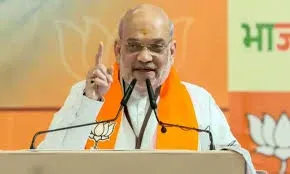
NEW DELHI: As the Narendra Modi government marked one year of its third consecutive term last week, it is increasingly clear that Amit Shah has become its most pivotal figure after the Prime Minister himself.
While holding the crucial Home portfolio—along with the Ministry of Cooperation—Shah's role now cuts across ministries, institutions, and the party organisation, shaping appointments, vetting policies, and managing internal alignments with authority.
Multiple senior-level appointments including gubernatorial ones are cleared only after receiving his nod. Legislative selections, reshuffles in the national and state units, and the coordination of politically significant arms of the government—including those related to tribal, border, and internal affairs—have similarly been routed through Shah's office. Senior bureaucrats confirm that no major policy decision with long-term national security implications moves forward without his explicit go-ahead.
His position has not been secured by proximity to the Prime Minister alone, but by performance.
Shah has cemented his authority through a firm and outcome-driven approach to internal security. The Ministry of Home Affairs under his watch has led a sustained campaign to dismantle separatist infrastructure in Jammu and Kashmir and deliver serious blows to Maoist insurgency in central India—a challenge once considered near-impossible.
The weakening of these long-standing threats has added decisively to his strategic credibility.
Equally notable has been his handling of the bureaucracy. For the first time in years, there is a perceptible restraint among senior Indian Police Service officers, many of whom had grown accustomed to institutional impunity. Shah has made it clear—through swift and unsparing action—that seniority or political proximity will not shield anyone from consequences. His willingness to act decisively, even against powerful IPS officers, has sent a message through the system that accountability is non-negotiable.
Within the BJP, too, Shah's decisions are keenly watched. Organisational matters that were earlier shared across multiple centres of power have now come under his direct command. He is leading the party's internal assessments in the run-up to key state elections, as well as recalibrating its approach to regional allies and caste formations—particularly in states like Uttar Pradesh, Bihar, and Maharashtra.
Unlike in the previous terms, where responsibilities were more evenly spread across key ministers, this term has seen a more streamlined distribution of roles—with Shah emerging as the principal executor of the Prime Minister's internal agenda. There is no ambiguity within the government or the party about where the ultimate authority lies. Key decisions—whether administrative or political—continue to originate from the Prime Minister. Shah's role is that of a trusted executor, not an alternative power centre. His centrality is a reflection of the trust he continues to enjoy from the Prime Minister, with whom he shares both a long political partnership and a deep strategic alignment.
It is this proximity and proven competence that have allowed Shah to shape outcomes across a wide spectrum of governance and party affairs. 'The Prime Minister has entrusted Amit Shah with coordinating several strands of internal governance in this term,' said a senior BJP functionary. 'It is a rational delegation and division of work.'
Astrologically, for those who place weight on such readings, Shah is currently in a phase described as one of maximum behind-the-scenes authority—driven by the Rahu-Venus dasha. This planetary period is seen to align with control, consolidation, and strategic expansion. However, the next major shift in his astrological cycle, beginning in 2029, is considered significantly more testing.